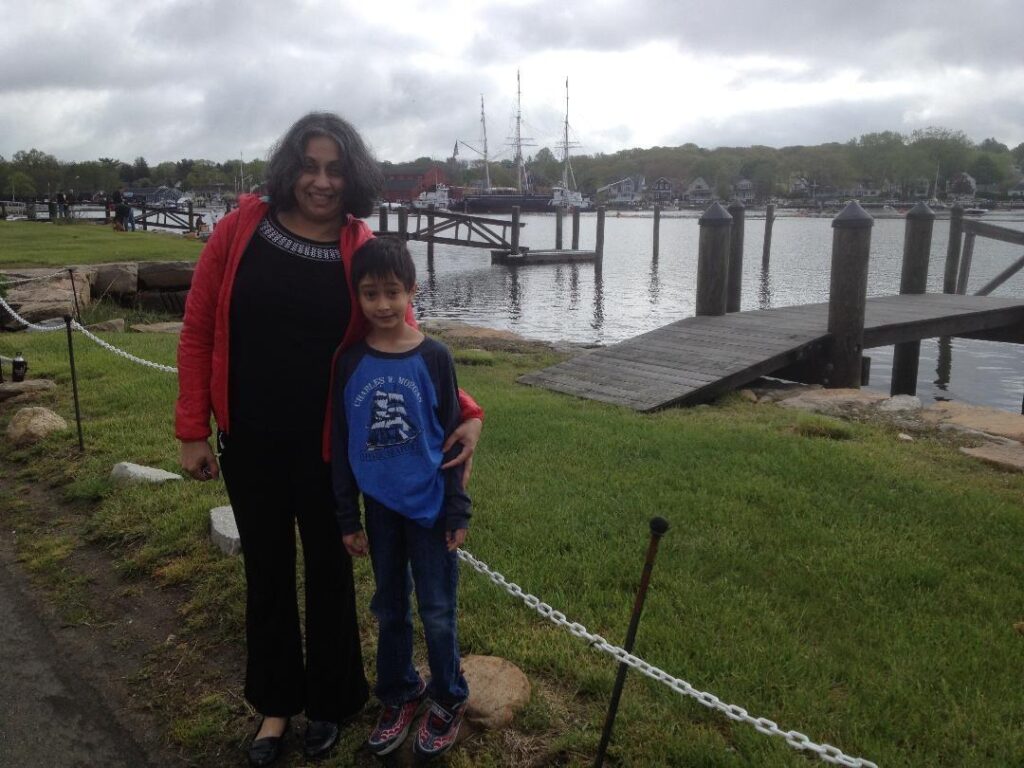TBBCF Survivor Series – Meet Uma Kuruganti
by ELLYN SANTIAGO

Now retired, former Pfizer Clinical Operations Director, Uma Kuruganti, underwent a lengthy, rigorous, and sometimes painful rollercoaster of breast cancer treatment nearly a decade ago. And through it, she worked. Perhaps a day or two here and there she’d not be able to make it in, so she’d work from home. Few of her colleagues even knew she was waging a preemptive strike against breast cancer. “I‘m not noble for doing that. At the time, for me, it was what I needed to do for myself to maintain my sanity!”, she said. Much later, her manager would tell her, “Uma, I don’t know how you did it.”
Her journey started with a routine screening mammogram and ultrasound that led to multiple biopsies, imaging and ultimately a diagnosis of Stage 0 breast cancer. Her treatment involved lumpectomies, radiation treatment and medication to reduce recurrence.
The phone call that changed her life
Even with no family history of cancer, as a scientist and a researcher, she was diligent about getting yearly mammograms and ultrasounds. In late November 2013, the testing, something that to date had been routine, wound up being far more. After an enhanced mammogram showed calcifications that were suspicious, the radiologist recommended a stereotactic biopsy, but felt it wasn’t urgent. She scheduled the
biopsy for early January 2014. A few days after the biopsy, she was on her way to an internal interview for a new and expanded role at Pfizer when she got a call from her doctor’s office. The doctor had the results of her biopsy and asked her if anyone else had contacted her. When Uma said no, the doctor said, “I don’t know how to say this, but it looks like cancer.” After a short discussion about the next steps, Uma went to her interview. In that interview, she tried to focus and concentrate. Afterward, she went home and called her doctor: “Tell me what you just said.”
What they found was that the tissue around calcifications was Lobular Carcinoma in situ which is more of a biomarker for the development of cancer in one, or both, breasts. An MRI was scheduled to take a much closer look. Meanwhile, she got a call from Pfizer saying she’d gotten the job. Her friend and manager, who was aware of Uma’s health issue, told her, “Whatever happens, I’m here for you”
That was reassuring, but nonetheless, Uma now had a daunting task ahead in her new job. And the MRI revealed “another area of concern.” And another biopsy. This time, an MRI guided biopsy.
“There was no lump. There was nothing,” she said. It was the procedures, one after the other, that brought with them pain. “Everything takes time,” she said, from January when she “got the cancer call” to March when she underwent the first lumpectomy.
“You’re going through so much emotion, but there’s the expectation by physicians that the patient makes all decisions. Here I am, a scientist, and I’m struggling with this. I expected some advice, but I didn’t get that. How do people without a scientific or medical background make the decision?”
Ultimately, she would undergo two sets of lumpectomies as the second area turned out to be DCIS (ductal carcinoma in situ) followed by medication and radiation with the latter adding another level of pain, something never told to her in advance.
“You go in, you get zapped and life goes on. Six weeks of treatment in four weeks. But I did not realize until later that my skin color would not protect, but rather absorb, the radiation. I wasn’t told that,” she recalled. “Halfway through the treatment, I was getting burned. It threw me that it was that intense.”
Seeing medicine through a patient’s eyes was one thing. Now she learns, but not from her healthcare providers, that radiation therapy in Brown and Black people may cause burns, a National Institutes of Health-published study explains. It took far longer for her to heal following radiation treatment and, in fact, many months afterward, she endured a lot of nerve pain. She said the radiation damaged her lymph nodes.
“You’re just trying to get through. It is a journey, and you just do the best you can” she said. “I had a lot of support from family and friends. But what she went through inspired her to help others. She volunteered to be a mentor with Chicago-based Imerman Angels, which provides no-fee personalized one-on-one cancer support for cancer fighters, survivors, previvors (people who are at higher risk of cancer), and caregivers.
Her first mentee was a woman, and person of color, in Virginia. She shared what she learned about radiation and its effects on Black and Brown people. That was helpful advice; the woman, who had suffered from neuropathy, was put on medication for nerve pain. She’s been matched with others as well. It’s an important role for her to play. Especially as a survivor.
“As I was going through treatment, it helped me to speak with others who had been through this before, and I wanted to pay it forward.”

About the Survivor Series
The hoped-for goal of the survivor series is to educate and inspire others who are struggling with this disease. Breast cancer is a life-changing experience. Some may prefer not to speak about this time in their lives, and that choice is respected and honored. Some may find it cathartic to share their experiences. If you are interested in sharing your story, we would love to hear from you with your answers to a few questions. Contact TBBCF Walk co-chair Shelley Gregory via email at [email protected] for more information.